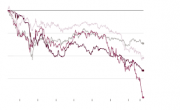Private Equity Cools on Emerging Markets
Barron's Sept. 2016
Investors are finally warming to emerging markets. The iShares MSCI Emerging Markets exchange-traded fund has jumped 17% this year, and emerging markets funds of all kinds have marked more than $130 billion in inflows, according to the Institute for International Finance in Washington.
But numbers from the private-equity sector make you wonder if something is wrong with this picture. New capital commitments to emerging market private-equity funds dropped 42% in 2015 to about $40 billion, and are plunging again this year toward 2009 levels, says London-based data tracker Preqin.








